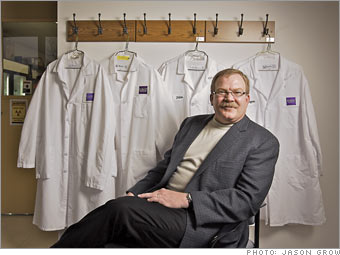The background: Bacterial infections once easily treated with antibiotics have gained frightening resistance during the past few decades. In 1974 just 2 percent of the most common form of staph infections found in hospitals were resistant to the common antibiotic methicillin; today more than 60 percent are impervious. This year nearly 2 million Americans will get bacterial infections while in a hospital; 90,000 of them will die.
The solution: New classes of antibiotics. Massachusetts-based biotech Cubist Pharmaceuticals released Cubicin in 2003 as a treatment for serious skin infections. In 2006 it was approved for bloodstream infections.
The payoff: Cubist, which went public in 1996, has brought in more than $320 million in Cubicin sales so far, making it the most successful new intravenous antibiotic ever. Third-quarter sales hit $50 million, a 65 percent jump from 2005, and annual revenue is expected to reach $200 million by 2008. Cubist has two new anti-infective drugs in the pipeline, awaiting FDA approval.
The opportunity: A handful of biotechs, including Basilea, Oscient, and Paratek, are already chasing new classes of antibiotics but have yet to get federal approval for their top prospects.

